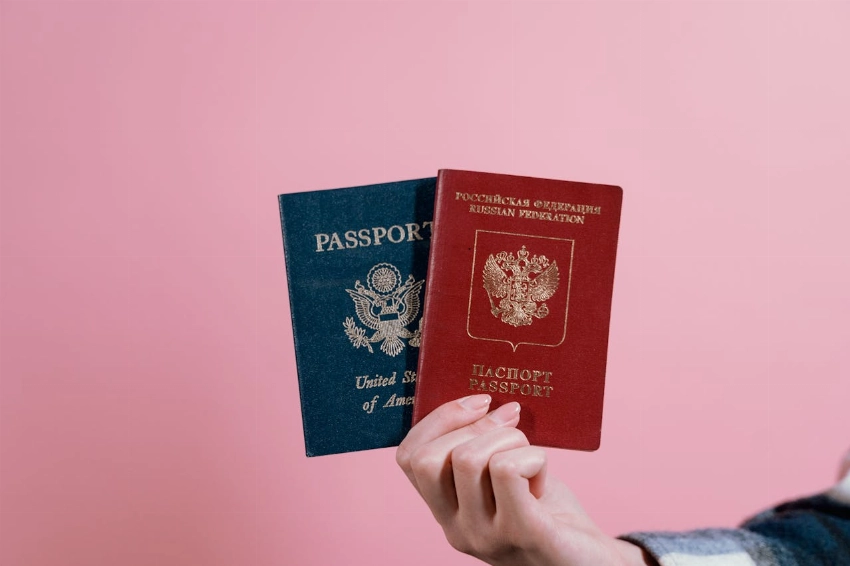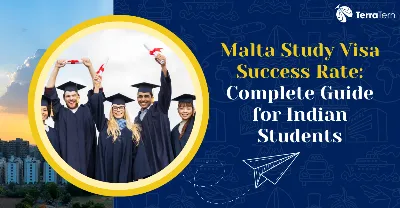Key Highlights
- What Is the Malta Study Visa Success Rate for Indian Students in 2025?
- Why Does Malta Have Such High Study Visa Success Rates Currently, Despite Overall Rejection Statistics?
- What Are the Latest Key Requirements That Determine Malta Study Visa Success Rate in 2025?
- How Long Does Malta Study Visa Processing Take and What Affects Success Rates in 2025?
- What Types of Malta Study Visas Are Available Currently and Their Success Rates in 2025?
- How Can Indian Students Maximise Their Latest Malta Study Visa Success Rate?
- What Are the Common Reasons for Malta Study Visa Rejections Despite High Success Rates in 2025?
- What Are the Current Benefits of Studying in Malta That Support High Visa Success Rates?
- How Do Latest Malta Study Visa Success Rates Compare with Other European Countries in 2025?
- What Should Indian Students Expect During the Malta Study Visa Interview Process in 2025?
- What Are the Recent Changes to Malta Study Visa Policies in 2025?
- Conclusion
The success rate of Malta study visa success rate in 2025 is one of the best in Europe among Indian students, with a range of 85-95% in well-prepared applications. This renders Malta a good destination for international education. Although the rate of general visa rejection in Malta is relatively high (38.5%), the student visa has much more positive statistics with the approval percentage.
Indian students consider Malta a location because of its English education system, low-cost tuition fees, and escalating post-study work prospects. The Malta study visa success rate is very high among Indian applicants with proper planning, documentation, and financial evidence.
What Is the Malta Study Visa Success Rate for Indian Students in 2025?

Malta study visa success rate is not a fixed figure; it all depends on the kind of visa one is applying for and the strength of the application package. Properly compiled students with all documentation and proper financial evidence are much more likely to be granted than those with missing or incomplete paperwork.
-
Student Visa Accessibility: On average, student visa approvals remain 8595, a key factor that makes Malta one of the most secure European learning destinations.
-
Consultant-Reported Success Rates: Success rates above 95 are boasted by many education consultants dealing with Indian students, so long as the applicant shows strong supporting documents and intent to study.
-
Rejection Rate Malta: Malta has a reported overall rejection rate of 38.5%, one of the highest in Europe. Nonetheless, this number is primarily for tourist and short-term visitor visas, visas not for student visas.
This opposition brings out a significant aspect; whereas Malta is tough on casual visitors, it accommodates actual students. Education is a priority sector in the country, and the institutions liaise efficiently with the immigration authorities to ensure deserving candidates have easy entry. Due to this, the approval rate of student visas remains high, even though the total rejection figures are high.
|
Visa Type |
Success Rate (2024-25) |
Notes |
|
Student Visa (Type D) |
85-95 |
High success rate with complete documents |
|
Short-term Study (C) |
90+ |
Easier approval due to shorter duration |
|
Tourist Visa |
61.5 |
High rejection rate (38.5%) |
Why Does Malta Have Such High Study Visa Success Rates Currently, Despite Overall Rejection Statistics?
Malta's student visa approvals stay high even though tourist visas face high rejections. The difference comes from systematic institutional support.
Main Factors Include
-
Institutional Support: Universities provide support letters and compliance guidance.
-
Clear Documentation: A structured checklist reduces mistakes.
-
Government Policy: Malta promotes education as an economic strategy.
-
Established Processes: VFS Global centres streamline applications.
Unlike tourist visas, study visas benefit from organised oversight. This explains why the Malta study visa success rate is much higher.
Also Read: Malta Nursing Jobs: Latest Opportunities for Nurses
What Are the Latest Key Requirements That Determine Malta Study Visa Success Rate in 2025?
Strong applications meet specific requirements:
Financial Requirements
-
Students must show €18 per day of the course duration.
-
Alternatively, a bank balance of around INR 10 lakhs (€10,000) is recommended.
Essential Documentation Checklist
Before pointers, here is the simple rule: all documents must be complete, valid, and verifiable.
-
Valid passport (6+ months validity with blank pages).
-
Acceptance letter from a recognised Maltese institution.
-
Health insurance with at least €30,000 coverage (Schengen-wide).
-
Proof of accommodation (hostel booking, lease, or confirmation).
-
Academic transcripts and certificates (apostilled).
-
Statement of Purpose (SOP) explaining study goals.
Common Rejection Reasons
-
Incomplete documentation.
-
Weak financial proof.
-
SOP lacking clarity or genuine study intent.
Meeting all requirements greatly improves the Malta study visa success rate.
Also Read: Malta vs Austria: Experts' Analysis of Two European Gems
How Long Does Malta Study Visa Processing Take and What Affects Success Rates in 2025?
The processing time is significant in the entire visa process. Documentation quality is not the only factor affecting the Malta study visa success rate; it is also the promptness and effectiveness with which an application is made.
Typical Processing Schedule
-
4 weeks (20-30 Working Days): The average of most student visa applications.
-
Between 12 and 24 Weeks: In case more institutional support or complicated verification is necessary.
Breaking down Timeline Breakdown
-
First Application Review: 5 to 10 working days.
-
Checking of Documents: 1015 working days.
-
Scheduling of Interview (Where Necessary): 1-2 weeks.
-
Final Decision: 3–5 working days
Variables That Influence Processing Speed
Application completeness: Incompleteness of the applications is a common problem that leads to delays and risk of rejection.
-
Seasonality: There might be peak admission seasons (July-September, December-January), leading to increased processing times.
-
University Guidance: Requests channelled through the institutions are faster since they are verified and checked in compliance.
Students who submit their applications at least 3 months before the commencement of their course have the advantage of a smoother processing, less stress, and higher approval rates. The early applications enhance the timelines and the overall success rate of the study visa to Malta.
What Types of Malta Study Visas Are Available Currently and Their Success Rates in 2025?

The Malta study visa success rate depends more or less on the different visa groups because the requirements and approval terms differ.
Schengen Type D Visa (Long-term Study)
Developed to be used in courses over 90 days.
-
Validity: In the event of continuing studies, valid up to 365 days.
-
Success Rate: Approximately 85-95 per cent of well-prepared applications.
-
Cost: Between €100 and €120.
Mostly preferred by Indian students who take full-time degree courses.
Schengen C Visa (Short-term Study)
Appropriate for short-term courses (less than 90 days) (e.g., short certifications or exchange programs).
-
Validity is a maximum of 90 days.
-
In most cases, has a greater approval rate than Type D, as there is a shorter commitment period.
-
Students can subsequently upgrade to a Type D visa to continue their studies.
EU Student Considerations
There is no need to have a study visa, especially for EU, EEA, and Swiss citizens.
However, in case of a course that lasts more than 90 days, they have to seek an e-Residence Permit to stay legally in Malta.
It is essential to obtain the correct type of visa. Full-time students apply for the Type D visa, and the Type C visa is more straightforward for short-term students. When used appropriately, the two pathways add to the Malta study visa success rate.
How Can Indian Students Maximise Their Latest Malta Study Visa Success Rate?
Students can improve their chances with strong strategies.
Financial Documentation Best Practices
-
Maintain steady bank balances for 6+ months.
-
Use multiple funding sources (family, self, sponsorship).
-
Include notarised financial support letters.
Academic Preparation
-
Select accredited and recognised institutions.
-
Ensure course relevance to past academics.
-
Write a strong SOP explaining future goals.
Documentation Excellence
-
Submit apostilled and translated certificates.
-
Provide comprehensive insurance covering €30,000.
-
Attach detailed accommodation and travel proof.
These steps directly influence the Malta study visa success rate.
What Are the Common Reasons for Malta Study Visa Rejections Despite High Success Rates in 2025?
Even with a high Malta study visa success rate, some applications fail.
Main Rejection Factors
-
Financial Insufficiency
- Weak or inconsistent financial proof.
- No valid sponsorship documents.
-
Documentation Issues
- Missing forms or expired documents.
- Poor translations or missing apostille stamps.
-
Intent and Credibility Concerns
- Weak SOP lacking genuine intent.
- Academic mismatch with chosen course.
- Lack of ties to home country (overstay risk).
By avoiding these pitfalls, students can ensure higher approval chances.
Also Read: Exams to Study Abroad: The Complete Updated Guide
What Are the Current Benefits of Studying in Malta That Support High Visa Success Rates?
The benefits of studying in Malta support the consistently high Malta study visa success rate:
Educational Advantages
-
English is the primary teaching language.
-
Alignment with UK education standards.
-
Affordable tuition compared to other EU countries.
-
Schengen membership allows European travel.
Post-Study Opportunities
-
9-month post-study work permit for Master's graduates.
-
Part-time work: 20 hours/week during term.
-
Possible work visa conversion for residency pathways.
Strategic Location Benefits
-
Mediterranean climate and a safe lifestyle.
-
Central European access for travel.
-
Growing industries in tech, finance, and tourism.
How Do Latest Malta Study Visa Success Rates Compare with Other European Countries in 2025?

The Malta study visa success rate is very competitive compared to other European destinations. Although the overall visa rejection rate in Malta may appear alarming at first glance, it looks much better when we narrow it down to student visas.
High Success Rate Countries (2024–25)
Among the countries in Europe, the approval rates of student visas have been known to be very high:
-
Lithuania – 98.7%
-
Finland – 98.3%
-
Estonia – 98.4%
The countries are some of the most preferred places where international students would wish to study because the processes are simplified, the guidelines are clear, and the policy supports education.
Malta's Position
The general visa refusal rate is 38.5%, mainly due to the harsh examination of tourist and short-term visitor visas.
The success rate of student visas is 85-95, and Malta is in a good position among the other EU states. Universities and colleges in Malta are actively liaising with immigration authorities to ensure that the admission of real students is easily processed.
Key Takeaway
Although Malta has one of Europe's highest general visa rejection rates, student-specific cases in Malta paint a very different story. The success rate of its study visa is quite good, which is a positive sign that the country has considered education one of its priority sectors and has been receptive to actual international scholars.
What Should Indian Students Expect During the Malta Study Visa Interview Process in 2025?
Not all Malta study visa interviews are compulsory, although it can be essential to be well-prepared when they are arranged. Although it may not be necessary, practising as though one may have an interview gives applicants confidence and guarantees uniformity in their application.
Possible Interview Topics
-
Course Choice/ Study plan: The nature of the course you selected and why you chose it, its relation to your academic interests, and its applicability to your career.
-
Funding Security and Proof of Finances: Excellent presentation of how the tuition fees and living costs will be paid, and additional evidence of having enough money.
-
Post-Study Career Plans: Do you plan to work in Malta, return to India, or seek opportunities elsewhere, and how will the course help you achieve those plans?
-
Relevance in Academics: How does your education or work experience relate to your program?
-
Education System Information of Malta: Familiarity with the institution you have applied to, and understanding of Malta as a study destination.
Interview Tips
-
Be coherent with what you write in your application documents and support papers.
-
Demonstrate the desire to study and show concrete and attainable objectives.
-
Be able to explain the funding sources, either through personal savings, family support, or a scholarship.
-
Identify career goals that are attainable and indicate long-range planning.
-
Be confident and clear; a well-prepared student creates more impact on visa officers.
A confident and well-organised approach will not only aid in smoothing the interview process, but this strategy will also play a positive role in the Malta study visa success rate.
Also Read: Difference Between Tourist Visa and Visitor Visa
What Are the Recent Changes to Malta Study Visa Policies in 2025?

2024-2025 Policy Updates:
Malta announced new student visa system changes in May 2024, designed to:
-
Simplify application processes for non-EU students
-
Streamline documentation requirements, reducing processing complexity
-
Include enhanced work rights for international students
-
Improve processing efficiency through digital systems
Current System Benefits:
-
Extended service requirements for courses exceeding 105 days
-
Systematic institutional support through established VFS Global centres
-
Clear processing timelines with institutional tracking systems
Impact on Success Rates:
These policy improvements likely contribute to maintaining high success rates for student visas despite the overall tightening of general visa requirements.
Conclusion
Malta study visa success rate is 85 95% in 2025 for well-prepared Indian students. This is far higher than Malta's general visa rejection rate of 38.5%. The success is determined by complete documentation, good financial evidence (at least 18/day or INR 10 lakhs), and a genuine interest in the study.
Indian students who submit their applications early, seek institutional support, and plan to do well have high chances of approval. Malta remains a European study destination with low-cost education, English-based courses, and post-study work opportunities.
Contact TerraTern for more information on the Malta study visa success rate.






